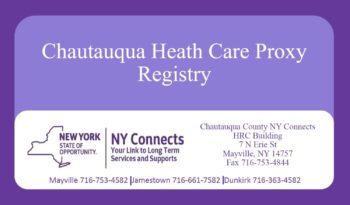More times than not, people think they have plenty of time to plan and make arrangements for end-of-life care. But, life can change quickly, so it is strongly encouraged to plan ahead.
Who will speak on your behalf if you are unable? Will they honor your wishes? These are difficult subjects to talk about.
The process of planning for your end-of-life care is known as advance care planning. The documents that formalize your wishes are known as advance directives. Advance directives are sometimes called living wills and healthcare proxies.
Facts about advance care planning:
90% of people say that talking with their loved ones about end-of-life care is important.
BUT 27% have actually done so.**
80% of people say that if seriously ill, they would want to talk to their doctor about end-of-life care.
BUT 7% report having had an end-of-life conversation with their doctor.***
**Source: The Conversation Project National Survey 2013
***Source: California Healthcare Foundation 2012
Additional information*:
People who undertake advance care planning are more likely to have their end-of-life wishes known and respected. Patients and their families are more satisfied with the care received after they have these conversations with doctors. Furthermore, people are less likely to receive unwanted aggressive medical treatments in their last weeks of life; less likely to die in the hospital or intensive care unit; and more likely to enroll in hospice, a comprehensive care program that supports patients and their families in the final phase of terminal illness with a focus on comfort and quality of life.
Some people worry that talking about death can cause patients and families to lose hope and even become sicker. However, research shows that advance care planning does not lead to depression, anxiety or emotional suffering and has no impact on patient survival. Although these conversations can be very emotional, families and patients generally find them helpful and appreciate the opportunity to prepare for the future.
*Pew Charitable Trust
Let us help you
Chautauqua Hospice & Palliative Care is here to help families in our community learn more about advanced care planning and the importance of it. If you have questions or would like assistance in formalizing your advance directives, please call us to schedule an appointment.
Download a New York State health care proxy form
Download a New York State Spanish health care proxy form
Download a New York State living will form
Download a New York State Spanish living will form
Resources
CompassionAndSupport.org – Resources you need to complete your advance directives.
Five Wishes – Offered by Aging With Dignity, has become one of the most popular living wills.
National Hospice & Palliative Care Organization – NHPCO offers downloadable documents for all 50 states.
National Institute of Health – Comprehensive advance care planning information.
Centers for Disease Control and Prevention – Comprehensive advance care planning information.
Centers for Disease Control and Prevention White Paper– Scholarly information on the importance of advance care planning.
AARP– AARP guidance about advance care planning.
The Conversation Project– Founded by Ellen Goodman, dedicated to helping people talk about their wishes for end-of-life care.
“Last Day” from Charlotte’s Web by E. B. White– This is a wonderful read and an even better conversation starter!
Chautauqua Healthcare Proxy Registry–  We are fortunate in Chautauqua County to have this registry, the management of which was recently transferred to NY Connects at the Office for the Aging. The registry contains the proxies of nearly 20,000 county residents and can be securely accessed by healthcare providers in an emergency. If your proxy is already recorded in the Registry, you don’t need to do a thing. If your proxy isn’t recorded in the registry, it should be. Call NY Connects at (716) 753-4582 to find out how to get your proxy into the registry.
We are fortunate in Chautauqua County to have this registry, the management of which was recently transferred to NY Connects at the Office for the Aging. The registry contains the proxies of nearly 20,000 county residents and can be securely accessed by healthcare providers in an emergency. If your proxy is already recorded in the Registry, you don’t need to do a thing. If your proxy isn’t recorded in the registry, it should be. Call NY Connects at (716) 753-4582 to find out how to get your proxy into the registry.
Here’s a light-hearted look at the serious subject of advance care planning. Zubin Damania is not only an accomplised physician, he also has been writing and performing comedic raps as ZDoggMD, an internet celebrity known for his music videos, parodies, and comedy sketches about medical issues as well as systemic issues with healthcare. In this video Tim Boon, RN and CEO of Good Shepherd Community Care in Newton, MA, raps in the Dr. Seuss tradition to raise awareness about ACP: